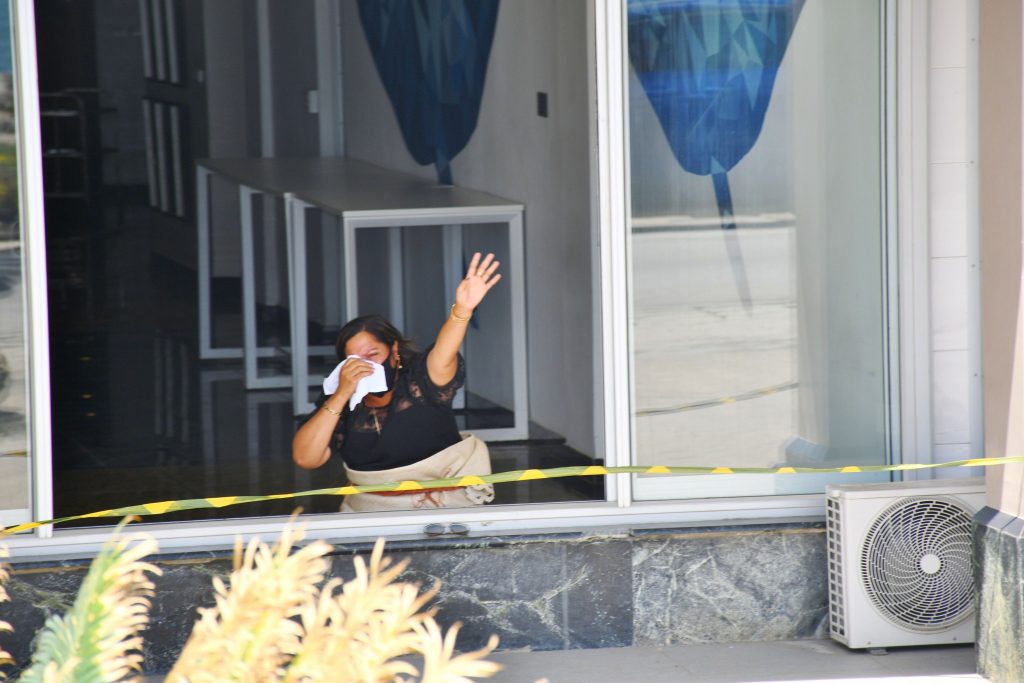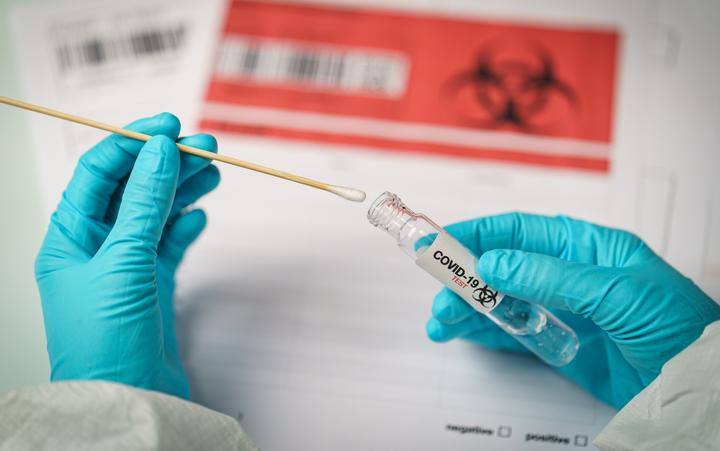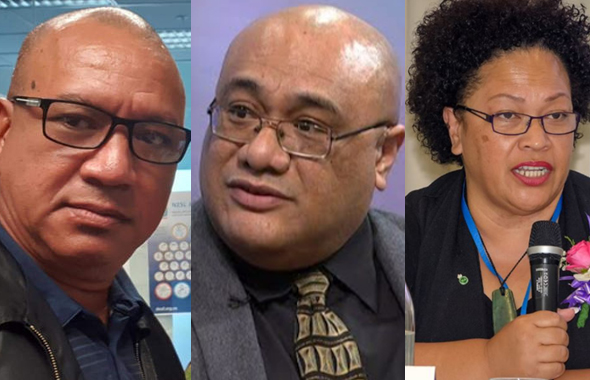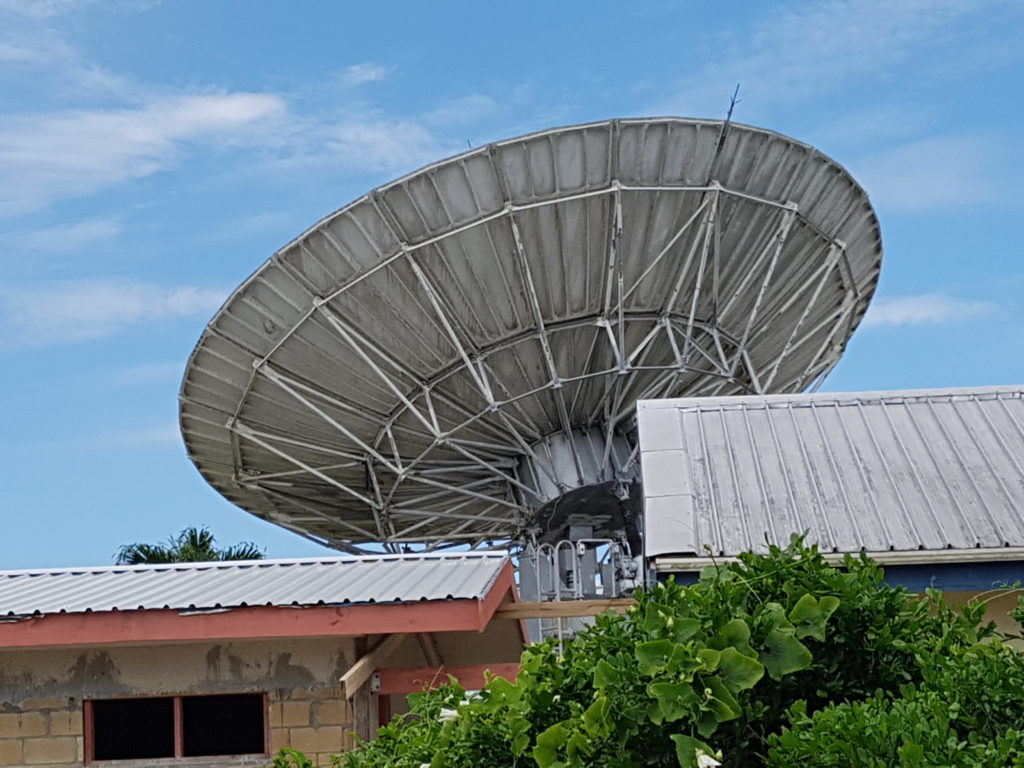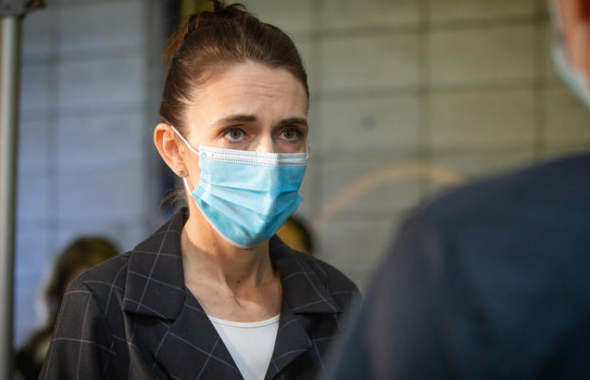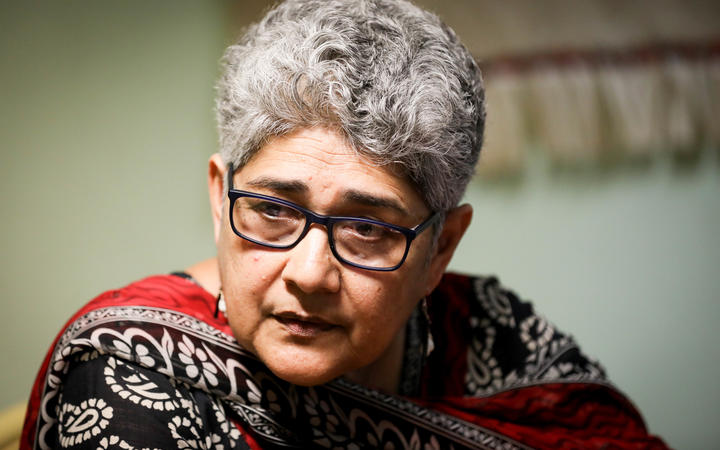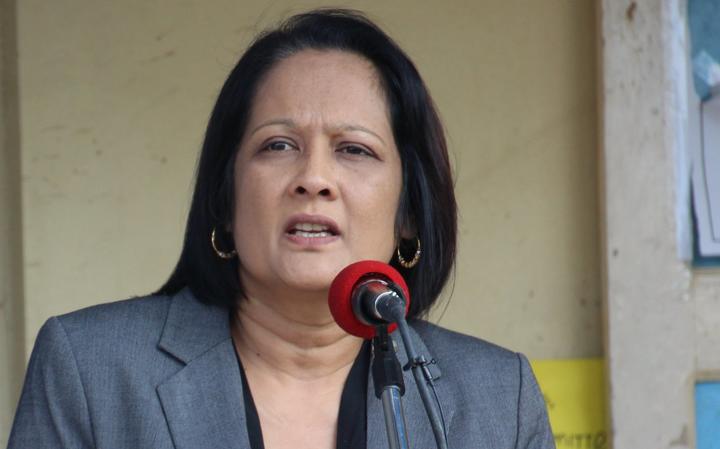By RNZ.co.nz and is republished with permission.
For the estimated 5,000 Tongans employed in New Zealand and Australia under their respective Pacific seasonal work schemes, the volcanic eruption and tsunami that devastated the Kingdom on 15 January 2022 was an entirely unforeseen event.
In its aftermath, a range of support measures have been implemented by key stakeholders – the employers, liaisons, government officials, community organisations and members of the Tongan diaspora in both countries.
This is to support the Tongan workers as they come to terms with the impacts of the natural disaster on their families and livelihoods back at home.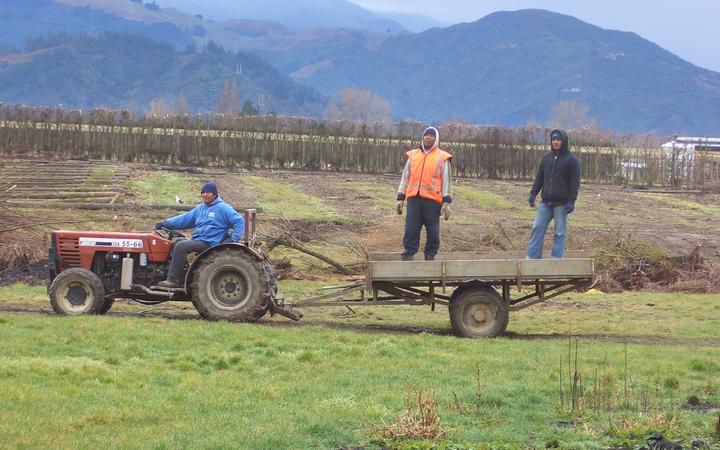
Tongan RSE workers in Motueka. Photo: Supplied/Charlotte Bedford
But the response efforts have been hampered by a recent outbreak of Covid-19 in the Kingdom – 196 cases confirmed so far.
Tonga’s prime minister Hu’akavameiliku Siaosi Sovaleni announced that Covid-19 lockdown restrictions will ease for seven days from Monday.
All government offices will open and the rules will also be relaxed for shops and takeaway food services. But the 6pm to 6am curfew lockdown remains.
Funerals and weddings are allowed and will still have the same number of people able to attend the events, with 10 inside and 20 outside.
Those needing to have their physical exercise can also do so with mask on and social distancing. Schools will remain closed for next week with radio school programs continuing.
A report published last week entitled Support for Tongan workers in Australia & New Zealand’s Labour Mobility Programs looks at ways the industry could help the islanders.
The report is the second of its kind and was co-authored by researchers – New Zealand-based Charlotte Bedford, and Rochelle Bailey, Gemma Malungahu, and Telusa Tu’i’onetoa – all of the Australian National University.
Lead author Malungahu hails from Tonga and said the project was special because of her links to the island.
She said there were options employers and host communities in the Recognised Seasonal Employers Scheme in NZ and the Pacific Labour Program in Australia could do to assist the Tongans.
Tongan seasonal workers in Brisbane, Australia. Photo: Supplied / Gemma Malungahu
“For Tongans living and working overseas, relationships and social ties with their employers and host communities – including members of Tonga’s large diaspora in New Zealand and Australia – are important elements of their sense of security and belonging while away from home.
“These connections can be especially important during times of crisis, as evidenced in the after-effects of Tonga’s recent eruption.”
The following is a snapshot of some support measures Malungahu and her team have found had been implemented for workers on both sides of the Tasman.
In the days immediately following the eruption, all Australian Approved Employers (AEs) with Tongan workers were contacted by DFAT (Department of Foreign Affairs and Trade).
Liaisons were asked to inform their workers about the difficult communications situation in Tonga, Malungahu said.
She said through the weekly communiqué that AEs received, employers were encouraged to support their Tongan workers by advising the workers how to contact appropriate community support organisations.
“Information has also been published on the Pacific Australia Labour Mobility (PALM) Facebook page which provides contact details for Tongan CLOs, the Tongan High Commission’s Second Secretary and the Consulate-General of the Kingdom of Tonga,” the report stated.
“Employers in both countries have offered various forms of assistance to their Tongan workers. These included providing workers with additional hours of work; subsiding or postponing worker deductions (e.g. for accommodation and transport) so that workers can send their earnings home, rather than use the money to pay their living costs.
“One Australian employer is matching fundraising efforts by their Tongan workers dollar for dollar; allowing paid time off work and providing workers with phone cards and access to the internet to facilitate communication with families at home.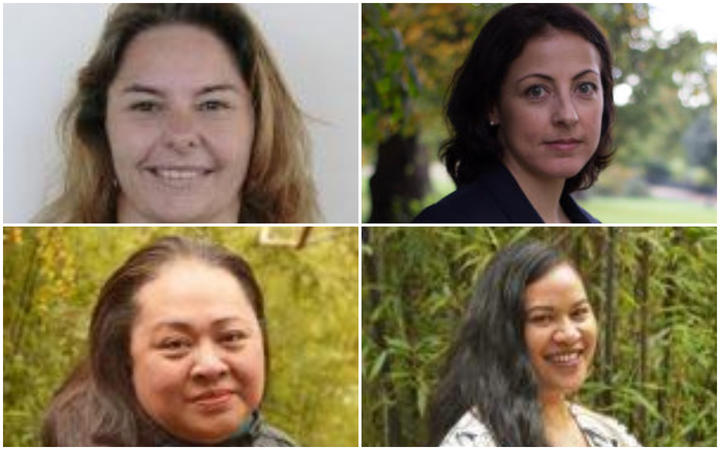
From top left to right, Rochelle Bailey, Charlotte Bedford, Gemma Malungahu and Telusa Tu’i’onetoa. Photo: Supplied
“Employers are also helping to finance shipment containers for workers to send home much-needed supplies, especially building materials.”
In New Zealand, the horticulture industry labour collective comprising NZ Apples & Pears, NZ Kiwifruit Growers, Summerfruit NZ, NZ Wine, NZ Ethical Employers and HortNZ have been collecting donations via the Growers Relief Fund to support small Tongan businesses such as market gardens to recover.
With 86 percent of Tonga’s population engaged in some form of agricultural production, the impacts of volcanic ashfall on crops, livestock and fisheries is a significant concern, the report stated.
Church groups and Pacific island councils
In the weeks following the disaster, Tongan churches in Aotearoa and Australia conducted dedication prayers for the Kingdom.
In Australia, the Pacific Islands Council and the Uniting Church groups have been providing support to Pacific seasonal workers for several years, most recently via the community connections programme.
“At the forefront of the current support being provided to Tongan seasonal workers is the pastoral, social, spiritual and practical support provided by the Uniting Church Synod of Victoria and Tasmania, The Pacific Islands Council of South Australia (PICSA) and The Pacific Islands Council of Queensland (PICQ),” the report stated.
Supporting workers’ mental health during times of crisis is essential, said Malungahu.
“Attending church, fellowship and bible study may be beneficial for Tongan workers particularly if church services are delivered in the Tongan language.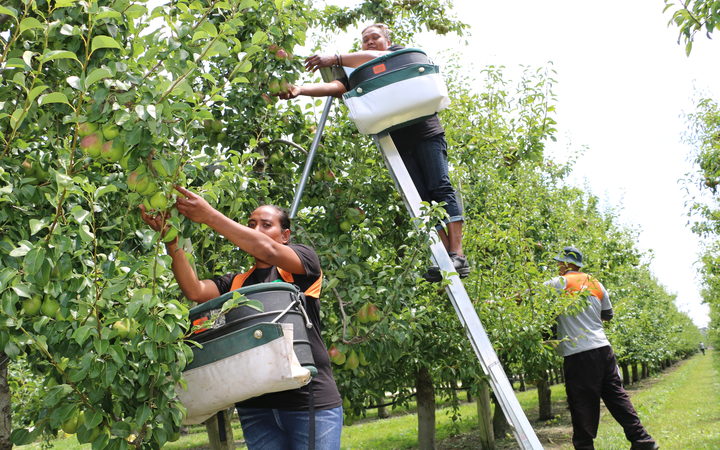
Janet and Roselyn at RJ Flowers Orchard in Hawkes Bay Photo: RNZ Lynda Chanwai-Earle
“PICSA, for instance, recently organised a church service for the Tongan seasonal workers in the Riverland Region, providing the workers with much needed solace and strength.
“The Tonga Friendly Islands Community of South Australia, established in August 2021, continues to support Tongan workers during this difficult time.”
Accessing kava clubs and other forms of social gatherings within the host community may also support Tongan workers’ well-being, Malungahu said.
Shipment of supplies to families back home
Direct efforts to send aid and supplies, such as food and water, to affected families in Tonga is providing much-needed comfort to Tongan workers while they are unable to return home.
In New Zealand, the Aotearoa Tonga relief committee provided the resident Tongan community with the opportunity to send drums of non-perishable food and water supplies back home to their families via shipment containers, free of charge.
Other shipping companies also sent goods and supplies to families in specific villages free of charge, for example, the Auckland-based container shipments to Kolonga and Ha’atafu, Tongatapu.
According to the Tongan Government, families would not be charged tax and customs duty for the next six months when receiving their goods from families overseas.
Malungahu said despite these mechanisms to support the shipment of goods to Tonga, families were likely to experience lengthy delays in receiving their goods.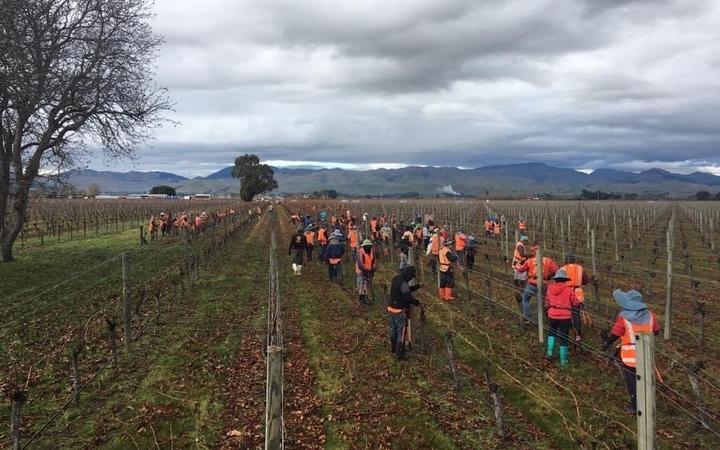
.. Photo: Supplied/NZ Ethical Employers
“This is due to sustained damage to the wharf in Nuku’alofa following the tsunami, the high volume of expected shipments, and the 72-hour mandatory quarantine period for goods, creating a bottleneck in the offloading process.”
Relief efforts in Tonga
Comprehensive relief efforts are underway in Tonga.
The National Emergency Management Office (NEMO), Tonga’s Red Cross and local NGOs have been working tirelessly with the communities in emergency and response efforts.
These have included the national clean-up and providing much needed shelter for families who were badly affected along the coastlines.
“NGOs in Australia and New Zealand are also providing support,” Malungahu said. “For instance, CARE Australia is working in partnership with MORDI Tonga Trust to provide immediate recovery efforts, especially in the agriculture and community development
“For seasonal workers whose families’ homes have been destroyed, the Tongan government and the Red Cross continue to provide support.
“Some families have moved in with other family or have relocated elsewhere with the support of the government.
“The Talitha Project and Women and Children Crisis centre offer trauma and counselling services for displaced Tongans and seasonal worker families who are going through a difficult time in the absence of their loved ones.”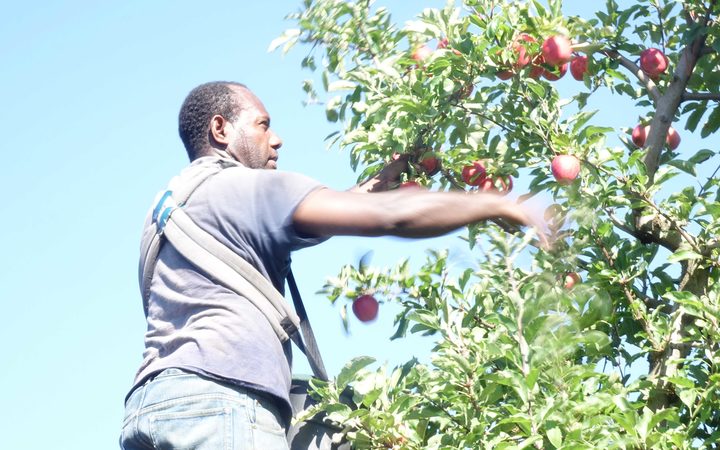
A ni-Vanuatu doing seasonal work in New Zealand under the Recognised Seasonal Employer scheme. Photo: RNZ / Johnny Blades
For seasonal workers, being reassured that their families are safe and being supportive will bring comfort to them despite not being home physically.
Moving ahead
As Tonga moves into its recovery and reconstruction stage, ongoing overseas aid is still needed, the report stated.
To ensure minimal duplication of resources and effort, Malungahu said Tonga needs a coordinated national response plan.
“Tongan workers residing temporarily in Australia and New Zealand also need to be kept in regular, full-time employment so that they can, in turn, financially support their families from abroad,” she said.
In the aftermath of previous natural disasters such as tropical cyclones Pam and Harold, Pacific seasonal workers have remained offshore to continue earning money and to send remittances to contribute to the rebuilding process.
“In the case of Pam, once borders reopened in Vanuatu there was also a notable increase in applicants for seasonal work in New Zealand and Australia,” the report stated.
“This helped ni-Vanuatu families recognise the potential benefits of earning a seasonal work income to support recovery efforts at home.”
When Tonga is in a better position to accept repatriation flights and recommence quarantine measures for returning Tongan nationals, getting the workers in New Zealand and Australia who are prioritised to return to their families, will be another crucial step in the recovery efforts.
